Lynch's Slider Stymies Astros, Offense Turns It On Late
Facing any team in back-to-back starts can be difficult, but when a pitcher succeeds while doing it, it's easy to get excited.
We hear so much about how difficult it is for a pitcher when they face a lineup a third time, and rightfully so. But what about when they have to face that same lineup a fourth, fifth and even sixth time? While it wasn’t that exact situation for Daniel Lynch because things change as time passes, he did have to face the same very good lineup that he went up against in Kansas City less than a week ago. When he faced them on Tuesday last week, he went seven innings and gave up just one run on four hits. Seeing them again in a much more hitter-friendly park would be a challenge.
And, quite frankly, he was up for it just like he’s been up for every challenge he’s faced since coming back to the big leagues toward the end of July. My first reaction of Lynch is that his fastballs had plenty of arm-side run. At first, that kind of worried me because I thought he was going to pitch scared of the Crawford Boxes in left field, but I just think he had some really crazy movement going on with his hard stuff. It’s actually a bit surprising to me that he didn’t get more swings and misses with how much the ball was moving.
What I think the Astros did extremely well against him was spit on pitches that just missed. Lynch was living on the edge of the zone most of the night. Just take a look at where the called balls were against him in this one:
That’s a lot of very close calls and probably a couple that should have been called strikes, but that’s another story. So the Astros were doing really well with that, but they couldn’t do much of anything against his slider. They were 1 for 7 with four strikeouts on the slider in the first five innings. In the sixth, he was leaving it up a little bit, but like I said before, it was sort of like he was going through the Astros lineup a sixth time. He did give up a couple hits on the slider, but it was absolute filth before he started to lose it a little bit.
These two to Aledmys Diaz on back-to-back pitches with the count 3-1 were borderline unfair.
The one he threw to strike out Jake Meyers in the fourth literally had me giggling at home.
And it wasn’t just the slider on swings and misses. This one he threw to Brantley while he was in trouble in the third was pretty much picture perfect. It was actually too good because he didn’t get Brantley to hit the ball hard enough for the ball to be a double play.
I thought Lynch made a really interesting point in his postgame press conference regarding pitching against teams twice in a row. He mentioned that he spent the entire year in 2020 at the alternate site facing the same hitters every single time. Obviously, those players weren’t quite on the level of this Astros offense, but I hadn't really considered that before. You can actually hear what he said here:

He’s now faced three teams twice in his nine big league starts. He was obviously quite bad against the White Sox and Tigers the first time, but here are his numbers the second time facing a team this season:
18 IP
15 H
2 R
2 ER
5 BB
16 K
1.00 ERA
It won’t always be like that for Lynch, but that’s a heck of a way to follow up against a team that’s already seen him. And of course, since coming back, he’s been outstanding.

It’s made some wonder who the better long-term bet is between him and Sunday’s starter, Carlos Hernandez. My answer to that is that I don’t know, but what a great question to be asking.
And for the second straight game, the offense just grinded away and ended up with enough runs for a convincing win. It felt a bit like they left a run on the table in the first, but they started to chip away. Ryan O’Hearn’s double with one out that would have been a lazy fly ball just about anywhere else started things and gave Emmanuel Rivera a chance to get a big two-out hit, which he did on a pitch right on the outer edge.
In the third, Salvador Perez took aim at that short porch in left field and hit a ball out that would have only been out of six total parks. But the good news is that the Royals were playing in one of the six.
And then they were quiet until they got into the Astros bullpen. They got to Yimi Garcia for two in the seventh and to Phil Maton for three in the eighth. The rally in the eighth was capped off by a triple to left-center field that meant nothing near what Lorenzo Cain’s double in New York did six years ago, but it sort of reminded me of that.
The broadcast touched on this quite a bit in the late innings, but it really did feel like they grinded out some at bats in this one. They worked four walks (two for Perez for the second time this month!) and struck out just four times in the game. They came to the plate 43 times and saw 169 pitches, which is 3.93 per plate appearance. That in itself isn’t exceptional. It’s above league average. But they averaged 4.28 pitches per plate appearance against the Astros bullpen. That is exceptional and sets up the rest of this series well, though the late inning runs kept them from seeing Kendall Graveman and Ryan Pressly, but the Royals will assuredly take that.
I also wanted to touch on the relief work, specifically from Domingo Tapia and Richard Lovelady. Tapia came into a really tough situation. The bottom of the sixth started with a throwing error from Emmanuel Rivera and then a solid single from Diaz on one of the few bad sliders Lynch threw. Tapia was tasked with getting out of that with just a one-run lead. Now, he was facing the bottom of the Astros order, but I wouldn’t call anyone but maybe Martin Maldonado a slouch in their lineup.
You can see his plan against Meyers. He wanted a double play ground ball.
And while he didn’t get that, he did get Meyers to chase that sixth pitch for a strikeout. Then he had the same plan against Taylor Jones:
This time it worked and he was out of the inning. He ended up walking Altuve with one out, and Lovelady was up in the bullpen specifically for the Brantley, Yuli Gurriel, Yordan Alvarez group, so in he came. And boy was he good.
He was working up and in on Brantley and got the popup by the fifth pitch. He did give up a hit to Gurriel, so this was another big situation for the Royals bullpen. Keep in mind this is still a 4-1 game at this point, so it’s not quite as tight as it was for Tapia, but still a close game.
He made one mistake that Alvarez didn’t pick up on, and ended up getting him on a filthy slider.
When Ervin Santana got Brantley looking to end the bottom of the ninth, the Royals had won their fourth in a row. They clinched the season series over the Astros. They improved to 20-15 since the break. Assuming the A’s or Mariners don’t overtake the Astros for first, they clinched a .500 record against first place teams (they’re now 18-13 with two more against the Astros and three against the White Sox). And they got Daniel Lynch his fourth big league win. A good night all around.
Crown Jewels
What’s Best?
In my weekly radio spot on 1320 KLWN in Lawrence yesterday afternoon, Derek Johnson asked me a question of what’s best for the Royals moving forward. What’s funny is Derek had no way of knowing that I’d been thinking about this for a bit with this team. In baseball today, you just hear so much about how there’s no point in winning 75 games because all that does is keep you out of the playoffs and out of a high draft pick. That’s a much bigger baseball issue than anything, but it’s the reality until (if?) something changes. So the question is should the Royals really be striving for all these wins? Is this just setting people up for a disappointment next season when they look at the last couple months of this year and get excited?
And my answer was one that might be surprising for someone who has the baseball mindset I do. They need to win as much as they can. No, they can’t make the postseason, but they also have pretty much no shot to draft any higher than fifth at best (worst?) and even that would require them losing more than the Marlins, Nationals and Twins. Right now, they’re sitting with the ninth worst record. I’m not going to get into the studies on where the most value in the draft comes, but the player you’re likely to have a chance at picking sixth is probably similar quality to the guy you have picking ninth. So why not win as many games as you can? It helps put butts in the seats, but it might even go toward convincing a free agent that you’re closer to winning than they might think otherwise. While I don’t think the Royals rebuild is over, I do think they’re on the back half of it with the farm system ascending and much of the top talent in the upper levels. So yes, win games. That’s the best move right now. And lately they’ve done just that.
Terrible Zone
I just want to touch on last night’s strike zone because that was terrible. Early in the game, it felt like Todd Tichener’s zone was pretty tight, but it seemed fair and consistent. Then things started going crazy. Here’s a look at the balls and called strikes for the Royals:
And for the Astros:
Yeah, they’re mostly good calls, but some of those are just ludicrously bad. It reached a point that each catcher almost did a double take at different times. One time, Maldonado actually turned around and said something to Tichener, which you never see a catcher do.
The problem is that these zones don’t do anything to further the game. They make a pitcher have no idea where they can throw the ball. They make a hitter have no idea what they should or shouldn’t swing at. It’s just not good for the game. The fact is that calling balls and strikes for generally middle-aged men with middle-aged eyes is really difficult. Guys are moving the ball like never before and throwing harder than ever before. It’s tough! But it’s also their job, and this was one of the worst zones I’ve seen all season once it started going haywire. I don’t have any real thoughts here other than that I’m very excited for the automated zone to arrive.




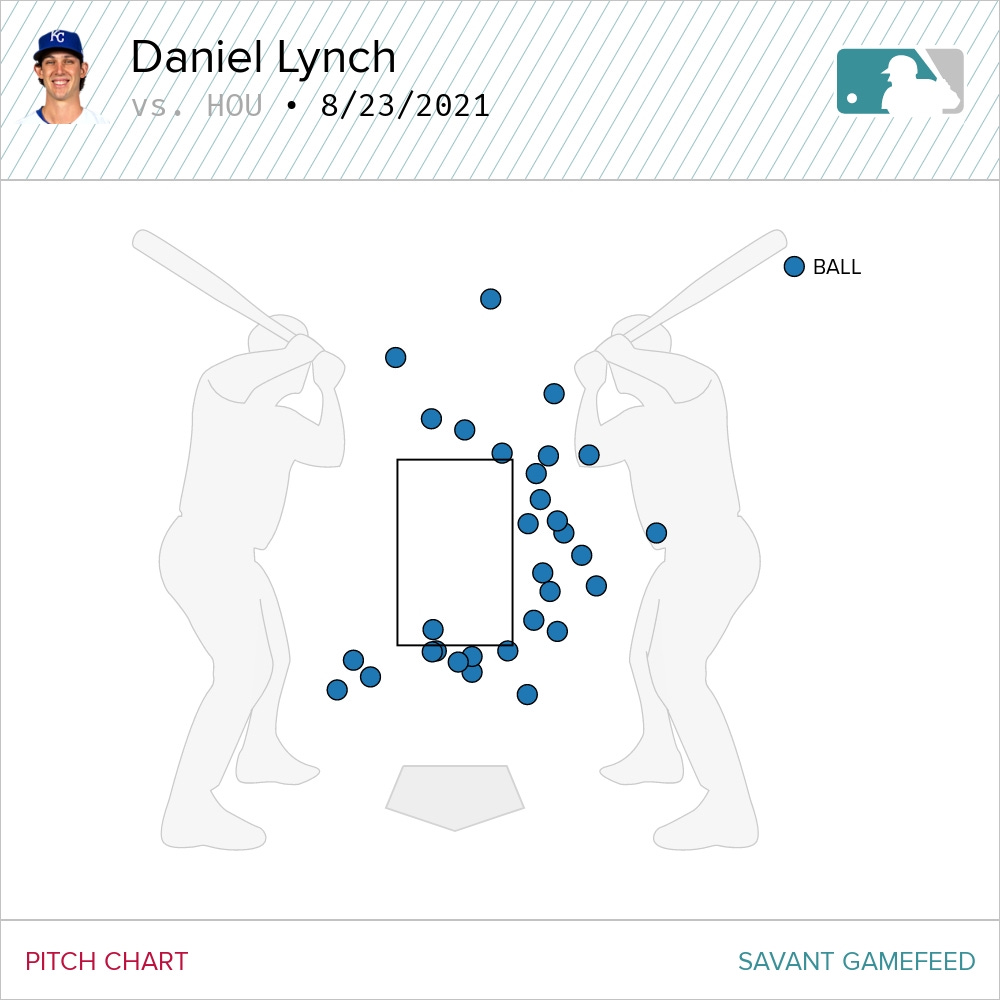


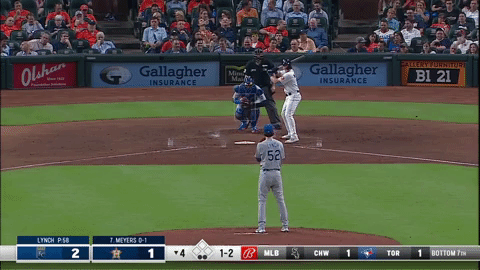

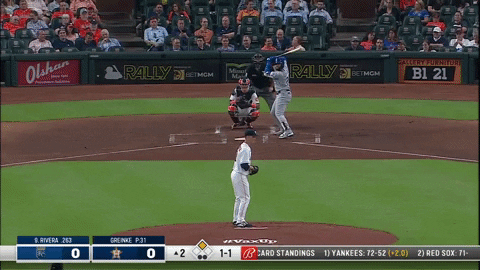
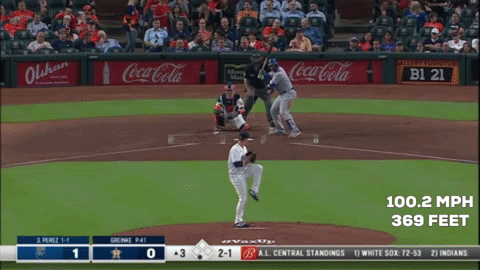



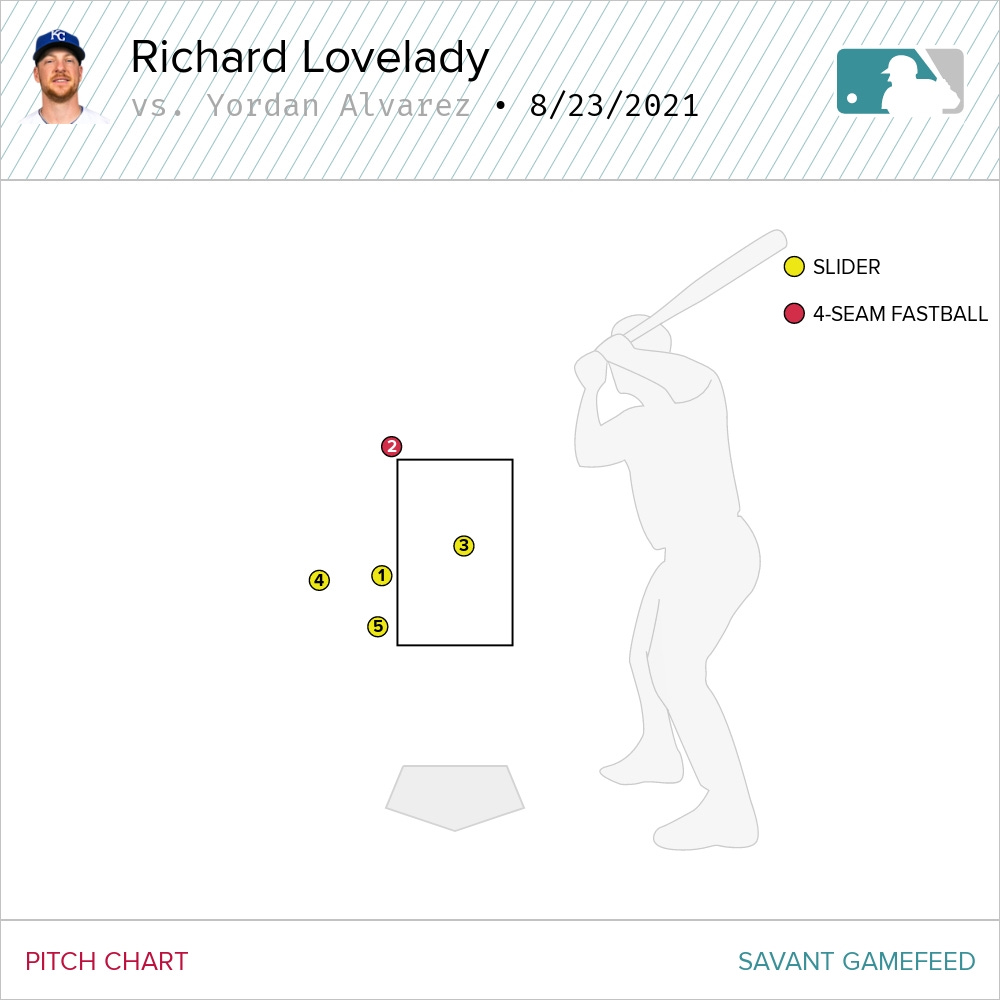


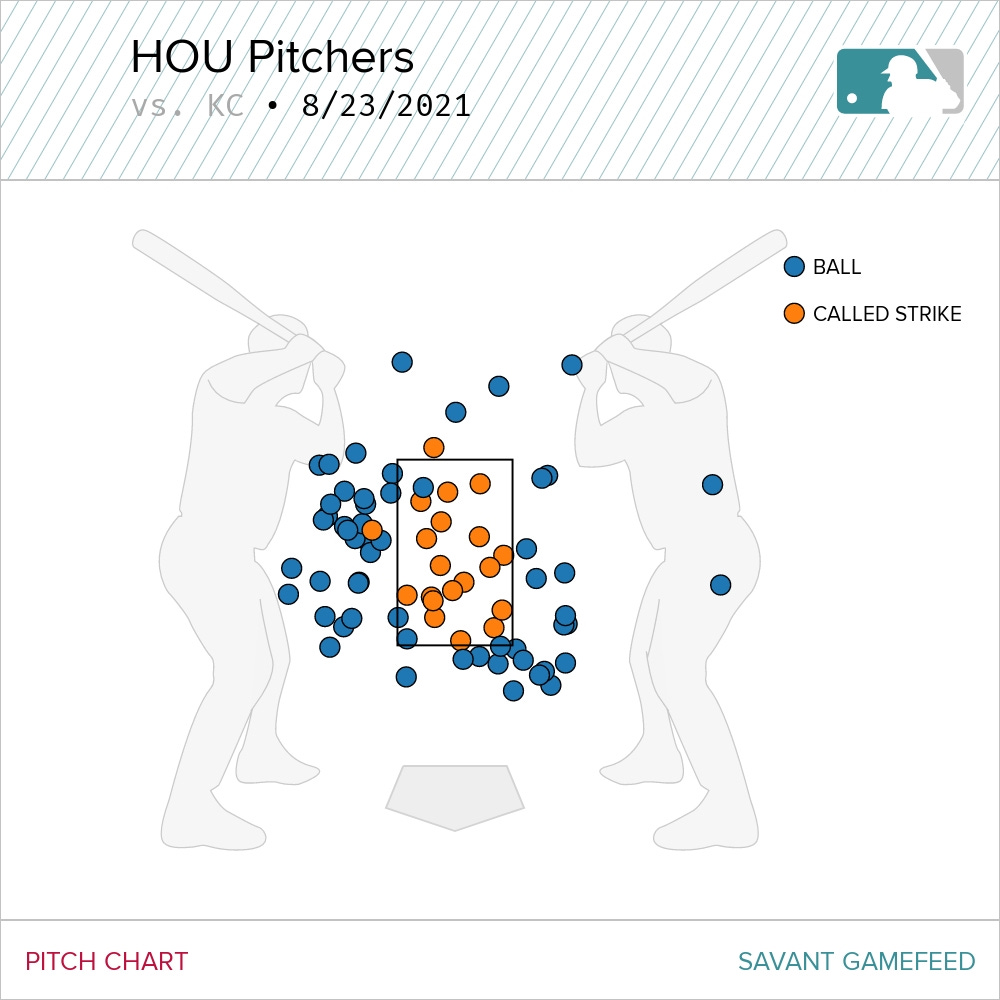
Re-sign Taylor